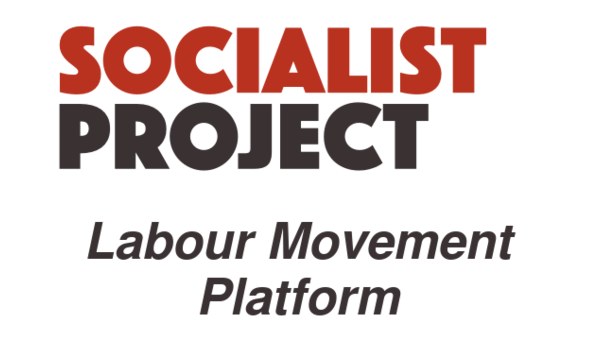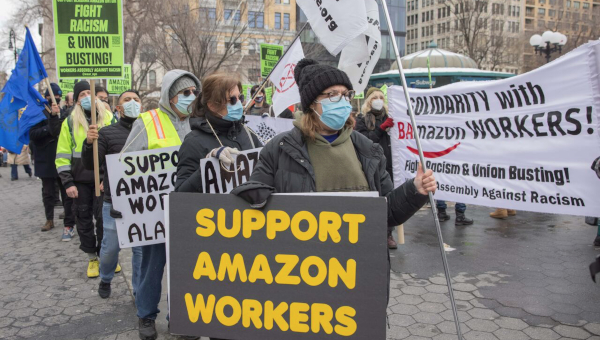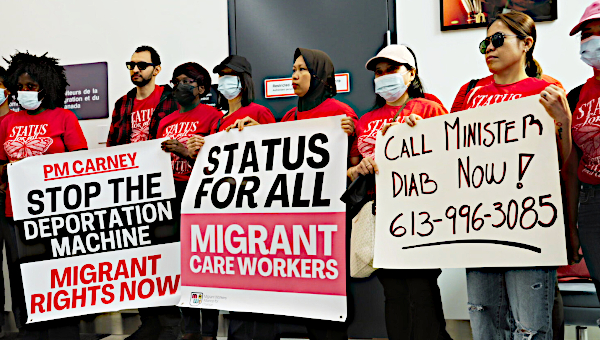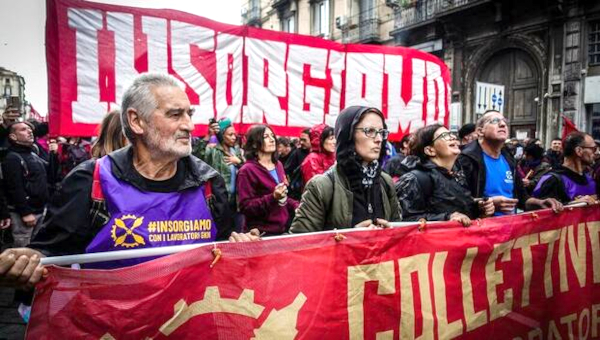Canadian Workers, the Social-Ecological Crisis and Alternatives
As workers, we are today confronted with the challenge of defending what we have and making gains in the face of an ever-expanding and relentless employer offensive. The employers’ drive to increase productivity and profits – central to capitalism everywhere – demands that we accept job loss and insecurity, concessions, new forms of speedup, and expanded management control in the workplace. More of us are forced to work in precarious forms of employment, making ourselves ‘flexible’ without access to unemployment and other social benefits or hope of a decent pension. Our economic insecurity makes it possible for employers to divide us and force upon us a false choice between jobs or the environment. Governments continue to reinforce the power of our employers with policies designed to undermine both individual and collective resistance. Our unions are weakened by divisions over how to respond, but most pursue strategies that fail to challenge the underlying causes of the problems we face. Many of us are experiencing a terrible isolation, as we lose both our links to the labour movement and our confidence in collective struggles.

Given these realities, many of us are asking: How can we rebuild workers’ strength and confidence? How can our movements retake the initiative and turn things around?
Our task is complicated by the fact that the current system leaves little room for us to make gains without raising bigger questions. When the economic and political elites respond to even our most moderate demands by telling us ‘there is no alternative’ (TINA), they are really saying that, within capitalism, there is no alternative to greater economic insecurity and inequality, the accelerated destruction of the environment, the further erosion of effective democracy, and periodic wars abroad to keep or bring people into global capitalism. The slogan ‘there is no alternative’ assumes that people must remain trapped in capitalism’s globalizing logic. However, our accumulated experiences tell us that capitalism itself has become the main barrier to addressing our needs and expanding our potentials. The options today have therefore become polarized: there is no real solution to our problems if we aren’t ready to challenge and go beyond capitalist rights and power and the domination of private markets over our lives. We therefore require more than a list of immediate demands: we must relate those demands to the struggle to build an alternative to capitalism.
An Alternative to Capitalist Globalization
Given the dominance of ‘TINA’ in even our own organizations, the most pressing need is to restore confidence in the possibilities for values and social relations other than the narrow and deformed ones capitalism offers. But this means taking on power at both the international and domestic level.
- Internationally, we need to create space for national experimentation. This demands the renegotiation or abrogation of trade and investment agreements: Since NAFTA, the World Trade Organization, and other ‘free trade’ agreements have resulted in a destructive competition for jobs between workers in different countries, any alternative must begin with their suspension and the creation of international economic relationships based on principles of equality, social justice, mutual aid and respect for national sovereignty. We can learn from efforts in Latin America to forge new relationships of mutual benefit rather than competition. We also need to limit our dependency on export competition.
- Domestically, the use of this space to realize our alternative vision requires the democratization of the Canadian economy: So-called ‘private’ economic decisions have major implications for the public good and must therefore be under democratic control, starting with what is invested, where and when. Investment decisions determine what kinds of jobs we have, where we have them and indeed whether we have jobs at all. Major industries, especially the banks, must be transformed into democratically elected and publicly accountable institutions. This would involve more than turning private businesses into state-run corporations; instead, new participatory public institutions must be built, so that all people residing and working in Canada have a genuine role in the economic decisions that govern their lives. These institutions would include cooperatively-run workplaces and means of distribution that ensure the wealth we collectively produce meets the needs of all people.
- The environmental crisis highlights the need for the above. Environmentally sustainable production and consumption means rethinking everything about how we produce and live and this can’t help but challenge the priorities and operation of capitalism. Capitalism’s destructive impact on the environment is undeniable. The choice is not between jobs or the environment, or even the creation of a distinct ‘green’ sector of the economy, but rather a transformation of all production and consumption so that we can satisfy our needs in environmentally sustainable ways. This would include expanding forms of collective production and consumption that reduce our reliance on the market and increasing the proportion of our economy that is produced and consumed locally.
- Taking on capitalist globalization starts at home and overcoming divisions within the workforce, but it also means extending our principles and strategies to incorporate a new global solidarity: We must build solidarity with workers elsewhere who share these goals, as part of a common project of making global space to pursue democratic approaches to economic and social development and to forge co-operative, rather than competitive, exploitative or imperialistic, relations between countries.
While these aims are ambitious, what can give us hope are the recurring examples of workers’ potentials to organize in order to resist, challenge and sometimes defeat those who control but also depend on our labour. At its best, the working class has seen its struggles as not limited to pockets of workers here and there, but as part of universal struggles for justice and freedom. When the labour movement was developing its strongest foundations, there was a much deeper understanding that the only alternative for working people was to challenge capitalist power and social relations. Trade unions and the broader labour movement can learn and take inspiration from this long history of struggle to develop new organizational forms and strategies adequate to tackling today’s difficult challenges.
However, at this point in time, we hardly have the political power to defend what we have, let alone put this vision on the agenda properly. Therefore, our challenge is to defend ourselves in ways that also build the collective capacities necessary to realize an alternative to capitalism’s imprisoning logic – the organizational capacities to analyze and understand, create democratic forums for collective participation and resistance, communicate and strategize. The platform outlined below speaks to this challenge. It combines a platform of demands to deal with the daily realities of working class life with the means for building our organizational and strategic capacities in the broad struggle for an alternative, truly democratic, social order.
Immediate Demands
We need to give priority to demands that address the inequalities and divisions within the working class in ways that are capable of building broad support. These demands need to be raised both at the bargaining table and in society as a whole.
- The right to a job for all those able to work;
- A living wage for all and full income for those who can’t work;
- Pay increases which reduce inequalities within workplaces;
- Reduction and redistribution of work time;
- A fully funded social insurance system encompassing unemployment, old age, disability, and all medical expenses, including drugs and dental costs;
- Fully paid parental leave for all workers;
- A fully funded, universal childcare system; and
- The full right to unionize and bargain collectively recognized as a democratic right for all working people
How Do We Win These Demands?
(1) By Building Class Solidarity
Unions are the most organized section of the working class and therefore have a fundamental role to play in building the capacities of the entire working class. But if the unions are going to play this role effectively, significant changes in the way most unions function and use their existing capacities are necessary. Currently, there is far too much competition between unions, especially when attempting to organize new members. There also needs to be more cooperation and solidarity in collective bargaining. What concrete means could help to build class solidarity?
- Sectoral organizing and bargaining is essential and will eventually make it possible to bargain on behalf of the entire working class. This means challenging the existing divisions within the union movement and the shape of the current collective bargaining system, which orients our attention to individual workplaces and fragments our solidarity. It also means unions must collaborate with each other to organize major employers in the private service sector, like Wal-Mart.
- Unions, directly or through Labour Councils, should finance, work with and support organizations that represent unorganized workers. The Workers’ Action Centre in Toronto, the Workers’ Organizing and Resource Centre in Winnipeg, and the Montreal Immigrant Workers’ Centre are good examples of the kinds of organizations which should exist in every city.
- Unions should use their bargaining power to back the efforts of other workers to organize.
- Unions should mobilize their members to support working class struggles beyond the workplace – in communities and around other aspects of our lives, such as housing, transportation, public services, and cultural life.
- Workers’ power to strike should be used for political as well as economic struggles. Political strikes can and should be used at appropriate times, such as protecting and expanding Medicare and enshrining the right to organize.
- The union movement must seek full rights for immigrant workers – both legal and “illegal” – in Canada. Many of these workers are forced to flee the developing world because of the hardships of neoliberal restructuring and are super-exploited by Canadian employers.
- The union movement must integrate feminist, anti-racist, queer and trans, anti-war and anti-occupation, anti-poverty, indigenous and environmental justice struggles and demands into its priorities and use the power of collective bargaining and political mobilization to fight against oppression and for justice and liberation for all. This would require building genuine relationships of solidarity between the union movement and other struggles for justice.
- Unions must support workers’ struggles in all countries, realizing that they can create openings for our own struggles, as can support for the right of nations to self-determination. Cross-border campaigns to build solidarity between workers across nations should become a priority.
(2) By Deepening Union Democracy
Building support for these priorities will require a real deepening of democracy in the labour movement. In today’s climate of crisis, real debate and extensive participation are seen by some as unaffordable luxuries and sources of division rather than strength. Members are encouraged to let leaders who ‘understand the current realities’ make decisions for them.
Contested elections are rare, and when they do occur, are often seen as expressions of disloyalty rather than a form of accountability and an opportunity for debate. ‘Participation’ has been reduced to ratification of leadership decisions and convention resolutions. But union democracy is about more than formal procedures and the ritual of voting. It involves developing the consciousness and genuine participation of the membership in the battle to define and defend their interests. Workers develop their capacities through the openings created by formal democratic processes, but democracy itself is created and deepened by the collective struggles of working people. If workers aren’t constantly deepening and extending their experience of democracy, not only is their energy, creativity and commitment lost to the movement, but the very capacities needed to create and run the alternatives to capitalist globalization proposed above are never developed. Union members must therefore have more opportunity to develop their capacities to direct and fully participate in union activities.
- More spaces should be created in which members from various unions can develop relationships, debate and decide upon key issues, work on common projects, and exchange ideas with other sections of the working class. These spaces would include non-unionized workers and members of community organizations involved in issues faced by working people.
- Special measures must be taken in union structures to address discrimination against racialized members, LGBTQ members, members with disabilities, young members, and women, and to ensure our full participation and development of our leadership capacities.
- Unions should examine their structures to ensure that members have a greater say in choosing who represents them.
(3) By Building a Socialist Political Party
In the end, even the best union is limited in its ability to unite the entire working class as a political movement to challenge capital. Unions need to find better ways of building class solidarity and deepening democratic practices, but workers also need their own political party. A socialist party could take the development of workers’ capacities to a new level through its involvement in ongoing political campaigns and struggles, creating new spaces through which to discuss and debate, learn and grow, and build our ability to work toward a socialist society. A party with the potential to do this, however, will be one which results from a sustained period of working, discussing and struggling together. •
Adapted from Labour Movement Platform pamphlet.





